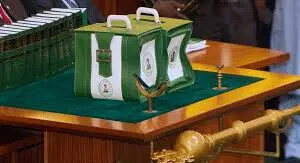The National Assembly’s joint committee on steel development has raised concerns over multiple breaches of procurement laws in the implementation of the Steel Ministry’s 2024 budget. They have called for a forensic audit of the ministry’s accounts to investigate “ghost projects” that may have misappropriated taxpayer funds.
During the 2025 budget defense session in Abuja, co-chair Zainab Gimba pointed out various infractions in the ministry’s submissions for the 2024 budget. She noted that many allocations, such as those for “capacity-building programs” and “skills training initiatives,” lacked evidence of execution or impact. Gimba emphasized that the information provided by the ministry raised more questions than it answered.
The committee has expressed concerns that certain projects within the Steel Ministry may be “ghost projects” aimed at misappropriating public funds. They noted a significant rise in administrative and recurrent costs in 2024 without a corresponding increase in the ministry’s activities or outputs, which may indicate mismanagement.
Additionally, there were identified legal violations, including breaches of the Fiscal Responsibility Act, which requires efficient use of public resources and accountability for project results. Specifically, projects related to Ajaokuta Steel did not meet these standards.
Other procurement law violations included non-competitive bidding and inflated contract costs, suggesting further disregard for established guidelines. The co-chair, Zainab Gimba, emphasized that ghost projects contravene Nigeria’s Financial Regulations, which require proper documentation and outcomes for all expenditures.To address these issues, the committee recommended a forensic audit and urged the ministry to provide all necessary documentation to the committee secretariat.
Looking ahead to the 2025 budget, Gimba raised concerns about the high proportion of personnel costs—57.2%—indicating a heavy focus on salaries over developmental projects. With only 34.6% allocated for capital expenditure, there is insufficient funding for necessary infrastructure, technology, and modernization in the steel sector. Additionally, there is a lack of detailed breakdowns for strategic spending areas.
In conclusion, the Steel Ministry’s 2025 budget shows a commitment to operational maintenance but lacks the capital investments needed to make the steel industry a significant contributor to Nigeria’s industrialization. The ministry must reform its funding priorities, improve operational efficiency, and enhance revenue generation to meet its strategic goals.
The joint committee expressed disappointment with the insufficient information provided by the ministry during the budget defense, emphasizing their dedication to thorough legislative oversight. Senator Patrick Ndubueze, the committee chairman, stressed the importance of developing a robust steel industry for Nigeria’s progress and called for a greater focus on capital projects rather than just salary payments.
